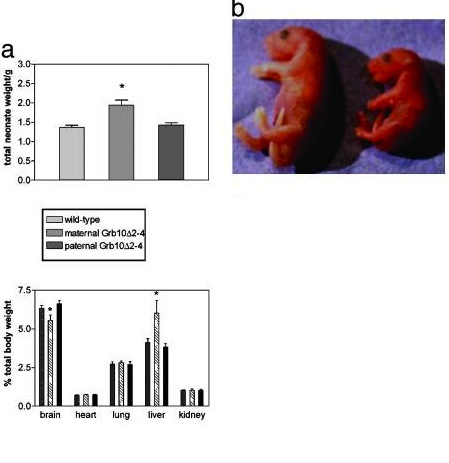Image:Tileshop-2.fcgi.png
From Proteopedia

No higher resolution available.
Tileshop-2.fcgi.png (449 × 463 pixel, file size: 121 KB, MIME type: image/png)
Licensing
{{subst:Non-commercial from license selector}}
Smith FM, Holt LJ, Garfield AS, Charalambous M, Koumanov F, Perry M, Bazzani R, Sheardown SA, Hegarty BD, Lyons RJ, Cooney GJ, Daly RJ, Ward A. Mice with a disruption of the imprinted Grb10 gene exhibit altered body composition, glucose homeostasis, and insulin signaling during postnatal life. Mol Cell Biol. 2007 Aug;27(16):5871-86. Epub 2007 Jun 11. PMID:17562854 doi:10.1128/MCB.02087-06
In section a, it is shown that the wild-type and paternal Grb10 knockout mice have virtually the same weight, suggesting that it is not the paternal Grb10 allele that inhibits overally body mass. The middle bar represents the maternal knockout Grb10 mouse and shows an approximate 30% increase in overall weight when compare to wild-type. This data is visualized in section b, where the maternal Grb10 knockout mouse (left) sows a significant size difference when compared tot he wild-type mouse (right). Directly below section a, a bar graph representing the percent total body weight of specific vital organs. The liver shows an overall increase in percent body mass while the brain shows a slight decrease.
File history
Click on a date/time to view the file as it appeared at that time.
| Date/Time | User | Dimensions | File size | Comment | |
|---|---|---|---|---|---|
| (current) | 03:56, 13 November 2012 | Jason Marks (Talk | contribs) | 449×463 | 121 KB |
- Edit this file using an external application
See the setup instructions for more information.
Links
The following pages link to this file:
